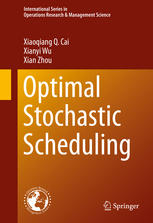

Most ebook files are in PDF format, so you can easily read them using various software such as Foxit Reader or directly on the Google Chrome browser.
Some ebook files are released by publishers in other formats such as .awz, .mobi, .epub, .fb2, etc. You may need to install specific software to read these formats on mobile/PC, such as Calibre.
Please read the tutorial at this link: https://ebookbell.com/faq
We offer FREE conversion to the popular formats you request; however, this may take some time. Therefore, right after payment, please email us, and we will try to provide the service as quickly as possible.
For some exceptional file formats or broken links (if any), please refrain from opening any disputes. Instead, email us first, and we will try to assist within a maximum of 6 hours.
EbookBell Team

4.8
24 reviewsMany interesting and important results on stochastic scheduling problems have been developed in recent years, with the aid of probability theory. This book provides a comprehensive and unified coverage of studies in stochastic scheduling. The objective is two-fold: (i) to summarize the elementary models and results in stochastic scheduling, so as to offer an entry-level reading material for students to learn and understand the fundamentals of this area and (ii) to include in details the latest developments and research topics on stochastic scheduling, so as to provide a useful reference for researchers and practitioners in this area.
Optimal Stochastic Scheduling is organized into two parts: Chapters 1-4 cover fundamental models and results, whereas Chapters 5-10 elaborate on more advanced topics. More specifically, Chapter 1 provides the relevant basic theory of probability and then introduces the basic concepts and notation of stochastic scheduling. In Chapters 2 and 3, the authors review well-established models and scheduling policies, under regular and irregular performance measures, respectively. Chapter 4 describes models with stochastic machine breakdowns. Chapters 5 and 6 introduce, respectively, the optimal stopping problems and the multi-armed bandit processes, which are necessary for studies of more advanced subjects in subsequent chapters. Chapter 7 is focused on optimal dynamic policies, which allow adjustments of policies based on up-to-date information. Chapter 8 describes stochastic scheduling with incomplete information in the sense that the probability distributions of random variables contain unknown parameters, which can however be estimated progressively according to updated information. Chapter 9 is devoted to the situation where the processing time of a job depends on the time when it is started. Lastly, in Chapter 10 the authors look at several recent models beyond those surveyed in the previous chapters.